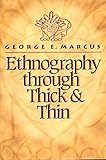Ethnography through Thick and Thin / George E. Marcus.
Material type: TextPublisher: Princeton, NJ : Princeton University Press, [2021]Copyright date: ©1999Description: 1 online resource (288 p.) : 1 line illusContent type:
TextPublisher: Princeton, NJ : Princeton University Press, [2021]Copyright date: ©1999Description: 1 online resource (288 p.) : 1 line illusContent type: - 9781400851805
- Ethnologists -- Attitudes
- Ethnology -- Fieldwork
- Ethnology -- Research
- SOCIAL SCIENCE / Anthropology / General
- Aborigines
- Afrocentrism
- Bateson, Gregory
- Bourdieu, Pierre
- Bright, Charles
- European Parliament
- Friedman, Jonathan
- Getty Trust
- Harvey, David
- Late Editions
- accountability
- affinity
- agency
- autobiography
- bifocality
- biography
- cannibalism
- capitalism
- categories
- changes
- chronotope
- classification
- collaboration
- colonialism
- comparison
- complexity
- connections
- constructivism
- detachment
- dialogism
- dialogue
- dissemination
- eccentricity
- ecology
- economics
- fetishism
- fieldwork
- globalization
- heterotopia
- historicization
- homeless mind
- identity
- individualism
- informants
- interdisciplinary arenas
- juxtaposition
- knowledge
- literary theory
- macro-micro
- metanarratives
- migration
- modernization
- 305.8/007 21
- GN345 .M373 1998
- online - DeGruyter
| Item type | Current library | Call number | URL | Status | Notes | Barcode | |
|---|---|---|---|---|---|---|---|
 eBook
eBook
|
Biblioteca "Angelicum" Pont. Univ. S.Tommaso d'Aquino Nuvola online | online - DeGruyter (Browse shelf(Opens below)) | Online access | Not for loan (Accesso limitato) | Accesso per gli utenti autorizzati / Access for authorized users | (dgr)9781400851805 |
Frontmatter -- Contents -- Acknowledgments -- Introduction: Anthropology on the Move -- PART ONE: AN EVOLVING PROPOSAL FOR MULTI-SITED RESEARCH -- One. Imagining the Whole: Ethnography's Contemporary Efforts to Situate Itself (1989) -- Two. Requirements for Ethnographies of Late-Twentieth-Century Modernity Worldwide (1991) -- Three. Ethnography in/of the World System: The Emergence of Multi-Sited Ethnography (1995) -- Four. The Uses of Complicity in the Changing Mise-en-Scène of Anthropological Fieldwork (1997) -- PART TWO: TRACES IN PARALLEL ETHNOGRAPHIC PROJECTS -- Five Power on the Extreme Periphery: The Perspective of Tongan Elites in the Modern World System (1980) -- Six. The Problem of the Unseen World of Wealth for the Rich -- Seven. On Eccentricity (1995) -- PART THREE: THE CHANGING CONDITIONS OF PROFESSIONAL CULTURE IN THE PRODUCTION OF ETHNOGRAPHY -- Eight. On Ideologies of Reflexivity in Contemporary Efforts to Remake the Human Sciences (1994) -- Nine. Critical Cultural Studies as One Power/Knowledge Like, Among, and in Engagement with Others (1997) -- Ten. Sticking with Ethnography through Thick and Thin (1997) -- Index
restricted access online access with authorization star
http://purl.org/coar/access_right/c_16ec
In the 1980s, George Marcus spearheaded a major critique of cultural anthropology, expressed most clearly in the landmark book Writing Culture, which he coedited with James Clifford. Ethnography through Thick and Thin updates and advances that critique for the late 1990s. Marcus presents a series of penetrating and provocative essays on the changes that continue to sweep across anthropology. He examines, in particular, how the discipline's central practice of ethnography has been changed by "multi-sited" approaches to anthropology and how new research patterns are transforming anthropologists' careers. Marcus rejects the view, often expressed, that these changes are undermining anthropology. The combination of traditional ethnography with scholarly experimentation, he argues, will only make the discipline more lively and diverse.The book is divided into three main parts. In the first, Marcus shows how ethnographers' tradition of defining fieldwork in terms of peoples and places is now being challenged by the need to study culture by exploring connections, parallels, and contrasts among a variety of often seemingly incommensurate sites. The second part illustrates this emergent multi-sited condition of research by reflecting it in some of Marcus's own past research on Tongan elites and dynastic American fortunes. In the final section, which includes the previously unpublished essay "Sticking with Ethnography through Thick and Thin," Marcus examines the evolving professional culture of anthropology and the predicaments of its new scholars. He shows how students have increasingly been drawn to the field as much by such powerful interdisciplinary movements as feminism, postcolonial studies, and cultural studies as by anthropology's own traditions. He also considers the impact of demographic changes within the discipline--in particular the fact that anthropologists are no longer almost exclusively Euro-Americans studying non-Euro-Americans. These changes raise new issues about the identities of anthropologists in relation to those they study, and indeed, about what is to define standards of ethnographic scholarship.Filled with keen and highly illuminating observations, Ethnography through Thick and Thin will stimulate fresh debate about the past, present, and future of a discipline undergoing profound transformations.
Mode of access: Internet via World Wide Web.
In English.
Description based on online resource; title from PDF title page (publisher's Web site, viewed 30. Aug 2021)


